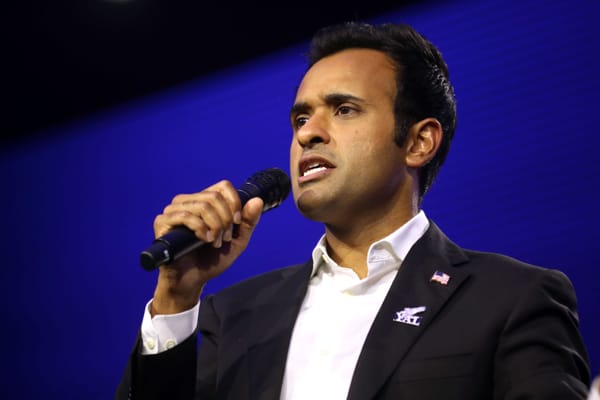Vivek Ramaswamy believes that America is at war with itself. In a recent interview with Thomas Klingenstein, chairman of the Claremont Institute, the long-shot Republican presidential candidate laid out a stark vision of conflict: “There is no middle ground, no room to compromise. Either you believe in free speech, or you believe in censorship. You can’t have both. Either you believe in a meritocracy, or you believe in group quotas.”
Ramaswamy’s poll numbers have flagged since September, when he peaked around 7 percent. But his message has resonated with conservative donors and activists. His unwavering support for Donald Trump also positions him to play an important role in a potential second Trump term. “Trump … knows we are up against an enemy that doesn’t want to improve America but destroy it,” Ramawamy said. “I give Trump a lot of credit for this.”
Ramaswamy’s uncompromising rhetoric has an analogue on the other side of the political divide. Warnings that Trump and his followers pose an existential threat to democracy reflect a similar judgment of the stakes of our political debates. When both sides define political conflict in such absolute terms, is there any space for moderation? The career of one of Ramaswamy’s heroes, Abraham Lincoln, suggests there may be.
Ramaswamy connects his political program with the American founding. At a Lincoln Dinner in Iowa in July, he argued that the “ideals that set the nation into motion 250 years ago” are “meritocracy and the pursuit of excellence.”
Meritocracy is a more recent thing. As obnoxious as today’s diversity regime can be, the apportioning of jobs and college admissions letters on the basis of racial considerations is far from new. Aside perhaps from a brief interlude, Ivy League schools and prestigious firms have always deliberately constituted themselves by limiting the admission of certain demographic groups and seeking out others. But Ramaswamy’s belief in individual merit accords with an old and honorable tradition that insists on equality before the law.
Yet more important than such historical debates is the vision of conflict on which Ramaswamy’s campaign turns. His language echoes that of Abraham Lincoln’s “House Divided” speech, which rejected the notion that America could tolerate a patchwork approach to slavery. “I believe this government cannot endure, permanently half slave and half free,” Lincoln told the audience. “It will become all one thing, or all the other.”
“Lincoln didn’t rush into the conflict he foresaw.”
Lincoln’s prophecy was vindicated, but it is worth recalling that Lincoln didn’t rush into the conflict he foresaw. As Lord Charnwood, the president’s great biographer, noted, Lincoln’s approach to controversial questions was characterized by “watching and waiting … suspending judgment, temporizing, making trial of this expedient and of that.” Charnwood contrasted Lincoln with John Brown. Like Brown, Lincoln was outraged at slavery, but unlike Brown, he adopted “a policy of deadly moderation towards it.”
To illustrate Lincoln’s opposition to slavery, Charnwood describes a trip Lincoln took down the Mississippi River as a young man. At a slave auction in New Orleans, he saw a girl “being pinched and prodded and trotted up and down the room like a horse to show how she moved, that ‘bidders might satisfy themselves,’ as the auctioneer said, of the soundness of the article to be sold.” Lincoln said little, one of his companions recalled, but a conviction of slavery’s wrongness “ran its iron into him then and there.” Even if this account is apocryphal or embellished, as some historians have believed, Lincoln’s subsequent actions demonstrate his abhorrence of slavery.
Yet Lincoln’s unshakeable conviction in the righteousness of his cause didn’t incline him toward rash action or indulgence in extreme rhetoric. Rather he acted as a “balanced and calculating person, with his finger on the pulse of the electorate while he cracked his uncensored jests with all comers.”
People who believe that the nation is as sharply divided as it was in Lincoln’s day would do well to study the means by which he navigated that crisis—not just his careful approach to weighing policy, but his close attention to the will of the electorate, and his earthy appreciation for the follies of his fellow men.
